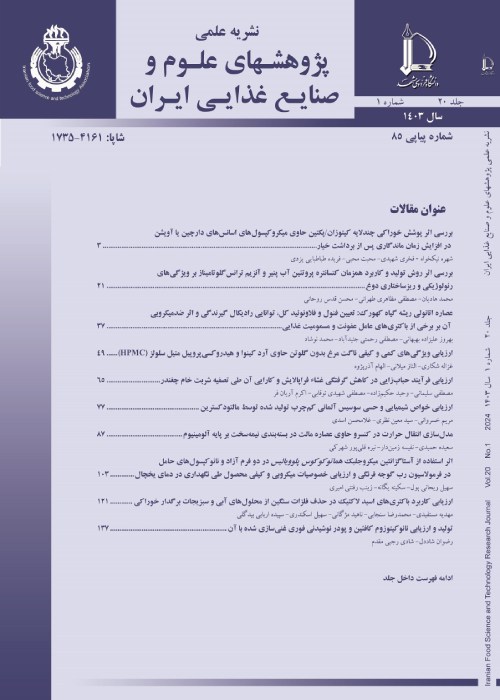Physicochemical and functional properties of acid precipitated soy proteins-maltodextrin conjugates
Author(s):
Abstract:
Introduction
Soybean is an excellent plant protein source with diverse applications in food systems. Despite numerous commercial applications and rich nutritional properties of soybeans, soy proteins are sensitive to heat and other damaging agents during food processing which can limit their applications in food industries. Maillard reaction includes a series of chemical reactions between the free carbonyl groups of carbohydrates and the un-protonated amino groups of proteins under mild experimental conditions. This is one of the most desirable approaches for applying in food systems, because of the safety of the procedure and the independency of adding extra chemicals. Natural occurring Maillard reaction can be a relatively safe and inexpensive method in order to improve functionalities of food proteins. The production of conjugates haspositive influences on food proteins functionality such as solubility, water holding capacity, emulsion activity and stability, foaming properties, thermal stability, whipping ability, textural and gelation properties and also reduce allergenicity of proteins. Due to the positive characteristics and reasonable price of both soy proteins and maltodextrin in food industries, the aim of current study was to enhance the heat stability and functional properties of soy proteins through glycosylation with maltodextrin. In addition, assessment of changes in protein properties as a function of incubation time were evaluatedMaterials And Methods
Preparation of purified soy proteins (Acid precipitated soy proteins) was done by a multistage process of washing, centrifugation, dialysis and freeze drying. The resulting powder contained pure soy globulins. Conjugation of acid precipitated soy proteins with maltodextrin was performed according to the method described as follows: protein-polysaccharide at a weight ratio of 1: 3 were dissolved in 0.01 M phosphate buffer, at pH values of 8, and were incubated at ambient temperature for 1 hr. Solutions were frozen at 80°C and then freeze dried. Lyophilized powders were incubated at 60 °C for 1, 3, 5 and 7 days, under 79% of relative humidity provided by saturated KBr. For each treatment an un-conjugated (control) sample was prepared under the same conditions. The formation of protein-polysaccharide conjugates was confirmed by sodium dodecyl sulphate polyacrylamide gel electrophoresis (SDS-PAGE) and gel filtration chromatography (Sephadex G-100 chromatographic system was used to separate the conjugated proteins from the un conjugated samples). Determination of protein denaturation temperature changes were carried out using METTLER TA Q100-DSC thermal analyser.The emulsifying properties of the samples including emulsifying activity and emulsion stability were assessed according to the procedure established by Pearce and Kinsella. Protein solubility was measured by calculating the amount of nitrogen in the supernatant and total nitrogen content of the samples and reported as percentage of protein solubility at pH 3, 5, 7 and 9. Foaming properties of the samples including foaming capacity and foaming stabilitywere determined using calibrated measuring cylinderDiscussion &
Results
When the heating duration is increased, wider and heavier molecular weight bands emerge near the top of the running gel of SDS-PAGE, and yet these were not observed in the control. As a result of conjugation, the protein-carbohydrate covalent binding occurs, producing heavier molecular weight species, and thus leading to its accumulation on top of the separating gel. Compared with un-modified soy proteins, the conjugated soy proteins eluted in the void volume of G-100 gel permeation chromatography column, suggesting increase in the size and molecular weight of soy proteins due to the covalent attachment of maltodextrin. According to differential scanning calorimetry (DSC) analysis, thermal stability of soy proteins was remarkably increased by conjugation with maltodextrin and maximum denaturation temperature was observed for the mixture incubated for 7 days. The improved thermal stability is manifested in increase in denaturation temperature of globular proteins, hence conjugation leads to significant improvement of soy proteins stability. Increase in thermal stability is the result of inclusion of the hydrophilic carbohydrate moiety to the surface of the proteins. Compared to control sample, the solubility, foaming characteristics and emulsifying properties were significantly improved by increasing incubation time. The protein solubility of conjugate remarkably increased at all pHs compared with the un-conjugated proteins. Covalent links between hydrophilic maltodextrin and soy proteins could enhance the reaction tendency between proteins and water molecules under unfavorable conditions. Improvements in the emulsifying properties of the conjugated samples can be explained by the fact that there is a combination among the emulsifying activity of proteins and the stabilizing impacts of polysaccharides per molecule. Foaming capacity of proteins can be affected by the solubility of proteins. Furthermore, maltodextrin is a hydrophilic carbohydrate which can improve the stability of soy proteins foams by acting as a thickener, thus increasing the strength of bubbles. It should also be considered that functionality of proteins are frequently influenced by protein solubility, and this could also serve the understanding of why improvements occur in functional properties of conjugated proteins, compared to un-conjugated ones. The results indicate that physiochemical and functional properties of soy proteins were modified and improved by conjugation with maltodextrin.Keywords:
Language:
Persian
Published:
Iranian Food Science and Technology Research Journal, Volume:12 Issue: 4, 2016
Pages:
453 to 462
magiran.com/p1635969
دانلود و مطالعه متن این مقاله با یکی از روشهای زیر امکان پذیر است:
اشتراک شخصی
با عضویت و پرداخت آنلاین حق اشتراک یکساله به مبلغ 1,390,000ريال میتوانید 70 عنوان مطلب دانلود کنید!
اشتراک سازمانی
به کتابخانه دانشگاه یا محل کار خود پیشنهاد کنید تا اشتراک سازمانی این پایگاه را برای دسترسی نامحدود همه کاربران به متن مطالب تهیه نمایند!
توجه!
- حق عضویت دریافتی صرف حمایت از نشریات عضو و نگهداری، تکمیل و توسعه مگیران میشود.
- پرداخت حق اشتراک و دانلود مقالات اجازه بازنشر آن در سایر رسانههای چاپی و دیجیتال را به کاربر نمیدهد.
In order to view content subscription is required
Personal subscription
Subscribe magiran.com for 70 € euros via PayPal and download 70 articles during a year.
Organization subscription
Please contact us to subscribe your university or library for unlimited access!



